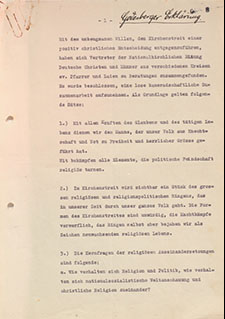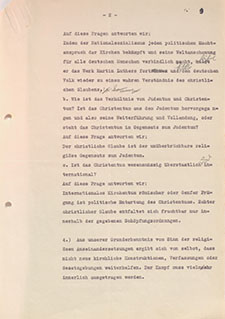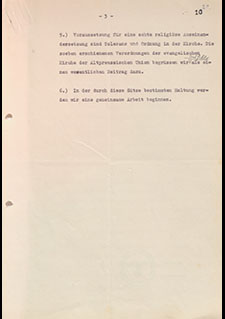The Godesberg Declaration
In the spring of 1939, Reich Minister of Church Affairs Hanns Kerrl undertook a new attempt to bring order to the divided German Evangelical Church. To this end, he wanted to unite all church factions on the basis of common principles, which were to be undersigned by the German Christians to the neutral “center” and even the moderate Confessing Church and presented to the public in a statement.
Kerrl hoped this would induce Hitler to change the state and party’s stance toward the Protestant church. The disputes surrounding the principles distressingly revealed how widespread and deeply rooted the aversion to Judaism was in German Protestantism.
The first draft of the principles, the “Godesberg Declaration” from the end of March 1939, gained notoriety. This declaration constituted a dreadful conflation of Christianity and Nazi weltanschauung. It defined Christianity exclusively “völkisch-nationally” and equally targeted Judaism and ecumenism.
It stated that the Christian faith is the irreconcilable religious opposite of Judaism. International ecumenism was defamed as political degeneration of Christianity. The declaration was undersigned not only by radical German Christians but also by numerous notable representatives of the neutral church “center”.
The Reich Minister of Church Affairs was however unable to move church leaders who were not German Christians to accept the declaration. He therefore entrusted representatives of the church “center” with drafting a new version, which was intended to accommodate the bishops affiliated with the moderate Confessing Church. Although the new principles from the end of May 1939 were toned down, they contained more severe statements on the relationship between Judaism and Christianity:
Nazi weltanschauung relentlessly combats the Jewish race’s political and spiritual influence on our völkisch life. In obedience to the divine order of creation, the Evangelical Church affirms its duty to keep our Volkstum (ethnic peoplehood) pure. Moreover, there is no sharper conflict in the domain of faith than that between the message of Jesus Christ and the Jewish religion of legalism and hope for a political Messiah.
The church leaders who were not German Christians did not sign, however. Instead, the moderate Confessing Church bishops August Marahrens, Theophil Wurm and Hans Meiser as well as a few other church leaders submitted another version of the principles to the Reich Minister of Church Affairs, which was toned down yet again. Yet, this version also stated:
In the domain of faith, there is a sharp conflict between the message of Jesus Christ and his Apostles and the Jewish religion of legalism and hope for a political Messiah. … A serious and responsible racial policy that keeps our nation pure is essential in the domain of völkisch life. Even a statement from the radical Confessing Church rejecting the Godesberg Declaration included the formulation: The Christian faith is in an irreconcilable religious conflict with Judaism.
Kerrl’s plan to unite all the factions of German Evangelical Church with one common declaration ultimately ended in a shambles. Although the church center still promoted the principles until the outbreak of war, neither the radical German Christians nor the church leaders who were not German Christians could not be moved to accept it en masse.
Since, under pressure from the Reich Minister of Church Affairs, August Marahrens, bishop of the Hannover regional church, and a few other church leaders who were not German Christians undersigned the principles after all, even the hitherto united front of church leaders who were not German Christians threatened to collapse.
Source / title
- ©Evangelisches Zentralarchiv in Berlin, 1/1271, Bl. 8ff.



